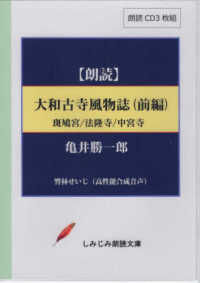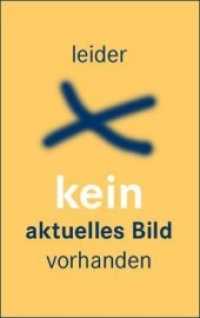- ホーム
- > 洋書
- > 英文書
- > Science / Mathematics
Full Description
This book gives an exposition of recently developed approximate dynamic programming (ADP) techniques for decision and control in human engineered systems. ADP is a reinforcement machine learning technique that is motivated by learning mechanisms in biological and animal systems. It is connected from a theoretical point of view with both adaptive control and optimal control methods. The book shows how ADP can be used to design a family of adaptive optimal control algorithms that converge in real-time to optimal control solutions by measuring data along the system trajectories. Generally, in the current literature adaptive controllers and optimal controllers are two distinct methods for the design of automatic control systems. Traditional adaptive controllers learn online in real time how to control systems, but do not yield optimal performance. On the other hand, traditional optimal controllers must be designed offline using full knowledge of the systems dynamics. It is also shown how to use ADP methods to solve multi-player differential games online. Differential games have been shown to be important in H-infinity robust control for disturbance rejection, and in coordinating activities among multiple agents in networked teams. The focus of this book is on continuous-time systems, whose dynamical models can be derived directly from physical principles based on Hamiltonian or Lagrangian dynamics.
Contents
Chapter 1: Introduction to optimal control, adaptive control and reinforcement learning
Chapter 2: Reinforcement learning and optimal control of discrete-time systems: Using natural decision methods to design optimal adaptive controllers
Part I: Optimal adaptive control using reinforcement learning structures
Chapter 3: Optimal adaptive control using integral reinforcement learning for linear systems
Chapter 4: Integral reinforcement learning (IRL) for non-linear continuous-time systems
Chapter 5: Generalized policy iteration for continuous-time systems
Chapter 6: Value iteration for continuous-time systems
Part II: Adaptive control structures based on reinforcement learning
Chapter 7: Optimal adaptive control using synchronous online learning
Chapter 8: Synchronous online learning with integral reinforcement
Part III: Online differential games using reinforcement learning
Chapter 9: Synchronous online learning for zero-sum two-player games and H-infinity control
Chapter 10: Synchronous online learning for multiplayer non-zero-sum games
Chapter 11: Integral reinforcement learning for zero-sum two-player games
Appendix A: Proofs








